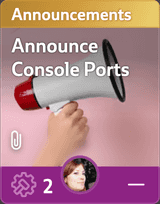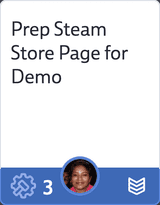
Gonçalo is the Head of Marketing at Codecks. He’s a big Pokémon fan (he has a tiny Bulbasaur right next to his work computer and a big Psyduck in his living room), still raves frequently about how much he loved Shadow of the Colossus (it’s been almost 20 years, Gonçalo!), and truly believes Codecks is *the* tool to turn ideas into videogames.
Codecks is a project management tool inspired by collectible card games. Sounds interesting? Check out our homepage for more information.
How to Build Better Collaboration in Game Development Teams
They say “It takes a village to raise a child”, and, really, making games can feel quite similar. At the end of the day, game development isn’t just about crafting stunning visuals or compelling gameplay: it’s about teamwork and collaboration. A game is more often than not the result of the creative work of dozens or even hundreds of people spread across time zones, juggling creative and technical challenges, and trying to ship on time—which can make collaboration… complicated, to say the least.
Without the right approach, remote and hybrid setups (which is exactly the one we have, here at Codecks) can lead to project delays, scattered communication, and frustrating bottlenecks. We believe this setup is the best, but we’re also aware that it can only work under the right conditions. Codecks exists in part to facilitate all sorts of collaboration in all sorts of setups, as one single tool the entire team can use for all their project management needs. But in order to keep a healthy, collaborative environment, it’s not just about the tools you have—it’s also about the way you work. And in this blog post, we’ll do a deep dive into best practices and tips for effective, consistent and productive team collaboration—no matter where your team members are.
The Challenges of Remote and Hybrid Collaboration
Remote and hybrid ways of working are, thankfully, more common than ever these days. They allow for more freedom, a better work-life balance, and they bring down that old-fashioned idea that you need to be in the office to be able to do any work. However… with everyone working in different places (and, in many cases, in different time zones), things can get messy, due to:
- Communication Gaps: Happen when task ownership isn’t clear, discussions get scattered, and important details slip through the cracks.
- Version Control Nightmares: When outdated assets, redundant work, and misaligned updates can slow things down. Outside an office setting, where teams can easily huddle up to check asset versions or clarify last-minute changes, these issues can be more prone to happen.
- Lack of Project Visibility: If no one knows what’s blocking progress, for example, milestones become moving targets.
- Meeting Overload: Too many check-ins can eat into time better spent actually making the game.
These can happen in-person too, of course, but in a remote or hybrid setting they can be exacerbated.

Best Practices for Effective Team Collaboration
The above problems can be prevented, though. There are specific ways of working remotely or in a hybrid setting that can keep things as productive, transparent and well-paced as when everyone was together in the same place, such as:
1. Get Serious About Task Management
- Keep meetings tight. Meeting fatigue is a real thing! Daily stand-ups should be quick status updates around tasks, not deep-dive discussions. If something needs more time, don’t be afraid to organize a one-on-one, or keep the conversation going on the specific board for your task, for example. If you need help organizing your sprints and your dailies, don’t worry—we’ve written about that, too!
- Use a centralized task management system where everyone can easily track their work. This is an obvious one, but it might be the most important tip here. It’s why Codecks exists in the first place: we wanted to build a centralized project management tool that does this specifically for game developers, which is also why Codecks offers a card-based system that makes it easy to see what’s in progress, what’s blocked, and what’s up next. With our Hand feature, for example, you can easily see what everyone is working on right now, along with their next tasks. We keep things visual, practical and playful, so every task can get done on time.
- Structure your workflow using whatever method keeps your team focused and adaptable—such as Agile or Kanban, for example. And use the tool that’s right for each one! Codecks’ deck-based system, for example, can be adapted for different styles, such as Agile or Kanban, and also the ways you want to implement these methodologies, such as Scrum. We’ve written before on all the different tools out there, and their advantages and disadvantages.
2. Keep Communication Clear and Relevant
- Ditch endless Slack or Discord threads. Keep discussions tied to tasks so everything stays contextual and easy to reference. Don’t be afraid to leave comments on tasks and have full conversations there! We made Codecks with this in mind, and in our tool, comments and reviews have to be explicitly marked as resolved in order for the conversation to be finished. We also remind you of any conversations that were left unresolved, making sure no discussion falls to the wayside.
- Define when to use synchronous (video calls, live chats) vs. asynchronous (emails, task comments) communication. If it’s urgent, jump on a call. If it’s not, write it down.
- Document decisions. A quick note in your project management tool can save hours of back-and-forth later. This is another reason why we made Codecks: just by using it, you’re documenting. We even have Doc Cards, a feature created specifically as a way to create and manage documents.
3. Map Out Dependencies to Avoid Roadblocks
- Keep track of your dependencies to always know what’s waiting on what. If an environment artist needs a level design layout before they can start, for example, that should be obvious to everyone—and everyone should be aware of it. Make sure everyone knows which tasks depend on what dependencies at all times using your project management tool or any sort of documentation, and keep things visual if you can—another reason why we created our deck and cards system! At Codecks, we’ve built an entire feature specifically for dependencies in game development, making it easy to track task relationships. Our feature has a unique function, too: we allow you to define asset pipelines, which then in turn allow you to define dependencies and automate dependency creation, ensuring a smooth workflow for every new asset.
- Regularly review dependencies so you’re not constantly waiting on one task to finish before another can start. This will keep things moving, and also make work less frustrating for everyone.
- Assign someone to keep an eye on bottlenecks and shift priorities as needed—things change, including dependencies and what can be done and when, and it’s important to adapt.
4. Make Asynchronous Work… Work
- Record key meetings so teammates in different time zones don’t miss out. Not everyone has to be in every single call!
- Use shared documentation (wikis, design docs, or task comments) to store important info where everyone can find it. And keep a central repository for all this documentation—be it your project management tool, a folder on Google Drive, whatever works.
- Be flexible with deadlines when possible. Working across time zones doesn’t have to mean delays—it can mean near-constant progress if planned well, but it’s more or less timeimportant to keep in mind that “end of business this Friday” can mean to different people. Be aware of this, and don’t be afraid to compromise.
Bringing It All Together
Collaboration, particularly in a remote or hybrid setting, isn’t about drowning in meetings or micromanaging every detail—it’s about clarity, trust, and having the right tools to keep the team moving forward. A game is the coming together of different voices, opinions and talents, all working together towards the same goal—and all those different voices deserve to be heard. And a well-oiled collaboration process, be it a structured workflow, smarter communication, or better visibility into dependencies, can ensure this, leading to fewer headaches and better games.
After all, game development can already be hard enough. Don’t let poor collaboration make it harder. Build a system that works for your team, refine it as you go, and keep making great games—no matter where your team is.
We’re obviously biased, but… we really think Codecks is ideal for this, and many, many studios around the world seem to agree. Wanna give it a try?


